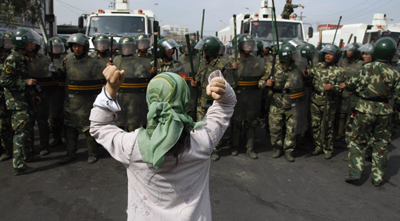Learning to read the tea leaves: Reporting in China
While the general trend in China is toward a more open environment, there is a tendency toward “soft harassment” by police, who threaten retribution to sources and news assistants for helping foreign journalists rather than interfering directly with the journalists themselves.
Xinjiang reporters detained; Beijing commentator missing
New York, July 13, 2009–Chinese police should halt the detentions of journalists reporting on ethnic violence in Xinjiang and reveal the whereabouts of a Uighur academic and Internet commentator who is missing and reportedly detained in Beijing, the Committee to Protect Journalists said today.
‘The mob turned on us’: Foreign reporters in Xinjiang
Chinese authorities have, unusually, welcomed foreign reporters to Xinjiang since ethnic rioting broke out on Sunday in Urumqi between the Uighur minority and Han Chinese. A Beijing-based agency has even offered to facilitate travel, according to one writer who blogs from Shanghai. (CPJ hasn’t confirmed his story. Have any other reporters been approached in this…
China: Some surprises, some old news in Xinjiang
Security forces were protecting, rather than harassing, international journalists covering riots in northwestern Xinjiang this week–a welcome change. A few have reported official interference since Sunday. But during previous outbursts of ethnic unrest in China’s Tibetan and Uighur autonomous regions, security forces have repeatedly antagonized and expelled the foreign press corps. Foreign reporters this week…
China postpones installation of filtering software…for now
China’s Internet censors have blinked. In the face of opposition ranging from PC makers abroad to bloggers at home, the Ministry of Industry and Information Technology has backed away, at least for now, from a hastily conceived directive that all new PCs sold from July 1 should carry filtering software.
Stoking, not suppressing, dissent in China
A self-styled army of Internet users, Anonymous Netizens, has announced its intention to wage war on government censors, starting July 1. Global Voices Online has the text in English; it’s also here in Chinese. Whether their scheduled attack (its nature is not specified) will be felt or not, the irritation of the document’s drafters is…
